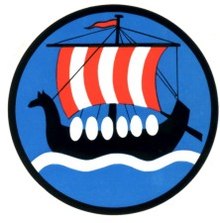Kampfgeschwader 100
| Kampfgeschwader 100 | |
|---|---|

Emblem of KG 100
|
|
| Active | 29 November 1941–2 February 1945 |
| Country |
|
| Branch |
|
| Type | Bomber wing |
| Role |
Air interdiction close air support Offensive counter air Maritime interdiction Strategic bombing |
| Size | Air Force Wing |
| Nickname(s) | |
| Equipment |
Dornier Do 217 Heinkel He 111 Heinkel He 177 |
| Engagements | World War II |
| Commanders | |
| Notable commanders |
Bernhard Jope |
| Insignia | |
| Identification symbol |
Geschwaderkennung of 6N |
Kampfgeschwader 100 (KG 100) was a Luftwaffe medium and heavy bomber wing of World War II, and the first military aviation unit to use an unpowered precision-guided munition in combat to sink a warship on 9 September 1943 with the destruction of the Italian battleship Roma, in the first successful use of the Fritz X armor-piercing, gravity PGM ordnance.
KG 100 was created from Kampfgruppe 100, a specialist pathfinder unit formed on 26 August 1938 as Luftnachrichten Abteilung 100 at Köthen. On 18 November 1939 it was renamed K.Gr. 100.
It was the first unit in the World to use Y-Verfahren navigation aids. It spent the inter-war years training on high-altitude flights to North Africa, the Eastern Mediterranean and northern Finland. K.Gr. 100 participated in all of the continental campaigns from 1939 to 1941, in a medium bomber and Maritime interdiction roles.
Stab./KG 100 was formed on 29 November 1941 at Chatres, France and placed under the command of Oberst Heinz-Ludwig von Holleben. The formation process was slow and not complete until April 1942. The Stab. unit did not possess more than one aircraft any time.
I./KG 1 was formed on 15 December 1941 at Märkisch-Friedland, equipped with the Heinkel He 111H-6. I Gruppe was transferred to Focșani, in Romania with 28 bombers under the command of Luftflotte 4 on 12 January 1942. Major Helmut Küster was the group's first Gruppenkommandeur.
...
Wikipedia
